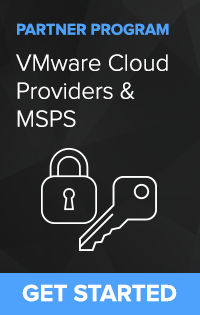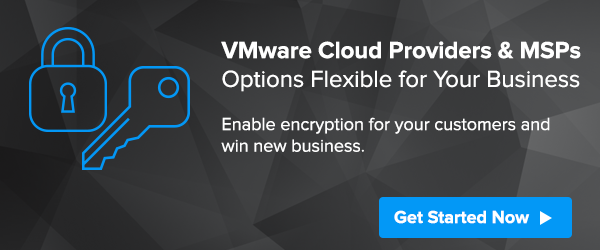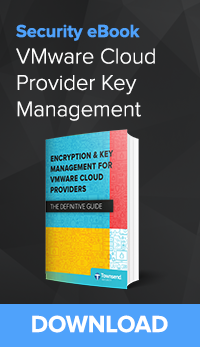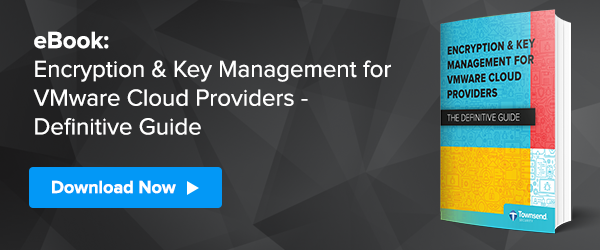MSPs fine tune their services to satisfy customers. You are the experts in configuring, deploying, monitoring and protecting the customer’s sensitive applications and digital assets. The services you offer are crucial to organizations large and small.
So why don’t MSPs lead by offering VMware encryption?
It often boils down to the Key Management Server (KMS).
 KMS vendors by and large are stuck on old and costly licensing models. It is not uncommon to find legacy KMS vendors charging in excess of $200,000 for an initial deployment in an MSP’s infrastructure. On top of that there are often additional charges as you do more encryption, and annual maintenance and support fees. This represents a major upfront investment by the MSP with no guarantee of realizing a positive return on that investment. This KMS pricing and licensing model almost assuredly locks out a small to midsize MSP.
KMS vendors by and large are stuck on old and costly licensing models. It is not uncommon to find legacy KMS vendors charging in excess of $200,000 for an initial deployment in an MSP’s infrastructure. On top of that there are often additional charges as you do more encryption, and annual maintenance and support fees. This represents a major upfront investment by the MSP with no guarantee of realizing a positive return on that investment. This KMS pricing and licensing model almost assuredly locks out a small to midsize MSP.
Then there is the complexity of most KMS systems. The MSP may have to invest a lot of time and resources in learning how to configure, deploy, and maintain the KMS. An MSP needs technology to be simple. Why? The complexity of end customer systems means that the average MSP has to know dozens or even hundreds of hardware and software application systems well. When you factor in PC, Server, Web, and Remote support, the MSP is responsible for a massive knowledge base and trained internal staff. A complex KMS system is just sand in the gears and another headache. It should be better, and it can be better.
KMS deployments can also be complex and not match the MSP business model. It is not uncommon for MSPs to charge their end customers a monthly fee based on the number of VMs and vSAN directories under management. When a KMS system requires handholding for each end customer, and uses a legacy pricing model with annual minimum payments and commitments, it becomes a nightmare for the MSP to realize a gain on encryption.
For all of these reasons many MSPs avoid encryption. It is understandable. Here is what one MSP told me before they learned how we approach the KMS need:
“You said the magic words of MSP and Low cost, consumption based! We’ve struggled to find a KMS solution we can properly price and sell to our customers to do VM encryption. Solutions like XXXXXX are prohibitively expensive. Your low cost per encrypted VM per month is very reasonable. I’m glad those MSP’s helped you understand our market and that you were able to see the opportunity. You NEED to be marketing this. You’re solving a problem that MSP’s a) don’t think they can afford to fix, and b) are just ignoring the compliance of because it’s “too hard and too expensive.” I highly encourage you to get the word out through marketing to MSP’s. Thank you, Patrick. You made my day.”
Sound familiar?
In the next blog I will describe how we are solving the KMS headache for MSPs. Not only can we make life easier, encryption can be a profit center for you without tipping over your business or putting you at a competitive disadvantage.
[For More Reading]
Part 1: Why Do MSP Customers Want Encryption of Their VMs and vSAN?
Part 2: What Has VMware Done to Help with Encryption Security
Part 3: What are the Biggest Obstacles to Offering VMware Encryption to Customers
Part 4: How Does Townsend Security Help and MSP Overcome the KMS Challenge?
Part 5: KMS for Multiple vCenter Clusters and Nodes
Part 6: As an MSP, How Do I Ensure High Availability (HA) for Encrypted VMs?
Part 7: How Can an MSP Use Encryption Security to Improve Revenues and Profitability?
Part 8: Some Common Questions and How to Get Started with the Townsend Security MSP Partner Program



